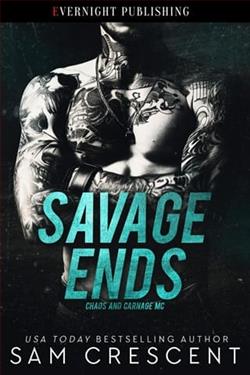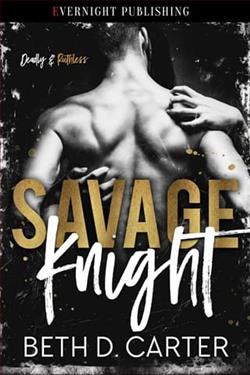Page 56 of Marrying a Reluctant Lady
She stoked the fire, then stopped. The smoke was not coming from the fireplace. It was coming from the corner of the room, where a small window opened out onto the garden. She breathed in, smelling something else—an acrid smell, like oil.
“No!”
She cried out the word, realizing what was happening. There was oil spilled through the window—she could see it glistening on the floor—and where it ran down the wall and the curtains, it was on fire.
Her first instinct was to run to the blaze, to try and put it out, but after throwing the glass of water off the table onto the fire, she realized that she had no means to put it out. It was growing by the second, the curtains catching alight and blazing with heat.
God, help me,Ophelia thought, terrified. She ran to thedoor.
The door was shut.
“No. No. No, please.”
She couldn’t think. She rattled the handle, throwing her weight against it. It was locked, or somehow stuck. She started to sob, terror filling her. The blaze was growing now, and the smoke made her eyes sting, burning her throat. She ran to the other window, trying to throw it open, but the curtains there were blazing too and there were only two windows in the room, both facing into the garden.
She looked around, too scared to move or to scream. The flames were licking up the curtains, and the chair was on fire now. She kicked the door, she was desperate and she had to get out.
“Please, God. Please, don’t let this happen.”
She was sobbing, raw terror blinding her and making it impossible to think. She breathed in, but the smoke caught her throat and she started to cough, and as she tried to breathe again, she choked and felt herself start to lose consciousness.
Chapter 21
“I’ll take tea in the westerly parlor, Mr. Crane,” Owen murmured, standing up from behind his desk. It was late and he could feel how stiff he was from sitting behind a desk for an hour. He rolled his shoulders and stood, going to the door.
“Very good, my lord,” Mr. Crane replied.
Owen went to the door, wondering why Mr. Crane was lighting the lamps in the hallway.
I need to find out what’s going on.
There was something unpleasant troubling the staff and he had to find out what. He ran a hand through his hair, wearily.
As he went down the hallway to his room, he found himself smiling, the unpleasant thoughts entirely eclipsed by the thought of seeing Ophelia. She had said that she’d wait in the westerly parlor for him to come down, and he’d left her waiting for too long. He ducked into his bedroom, checking his hair. He still looked good. He blushed. He wanted to talk to her, to try and explain how he felt. And to do that, he wanted to look his best.
He hurried downstairs, pausing in the hallway. There was a strange smell—oily, and acrid too, like smoke. He breathed in again and his heart started to thud. It was smoke.
“Ophelia? Ophelia!”
He ran towards the parlor, heart thudding in horror. The door was shut, but the smell of smoke was strong. He thumped on the door with his fists.
“Ophelia?”
There was no answer, but if he stood still and listened in the hallway, he could hear the crackle of flames. He stopped thinking.
“Fire!” he shouted. “Mr. Crane! Mrs. Crane! Fire!”
He screamed the words at the top of his lungs, hoping someone would hear and come to help. He considered running to the kitchen to summon all the servants so they could help put out the fire, but he dismissed the thought at once. Whatever was happening, it was something that required immediate attention. Any running for help would only cause a delay.
“Ophelia!” He yelled again.
When there was no answer, he didn’t pause. Stepping back, he ran to the door.
The impact made him cry out. The door was solid, and it threw him back, jarring every muscle he had. He drew a breath. He had to break it. He had to get in. He considered shooting off the lock, but again, he’d need to run to his room to fetch a dueling-pistol, and by the time he got back and shot off the lock, he’d be too late.
He stepped back and ran to the door again. And again. His body slammed into it, and he felt it jarring on its hinges and he stepped into the hallway, gasping for breath. The smell of smoke was becoming stronger—he couldn’t imagine how strong it must be in the room. He ran back a few paces and ran to the door, shouting at the top of his lungs, a cry that was a plea for help and a triumphant shout, because, as he slammed against it, the hinges gave way.
“Thank you, God,” he whispered aloud.















